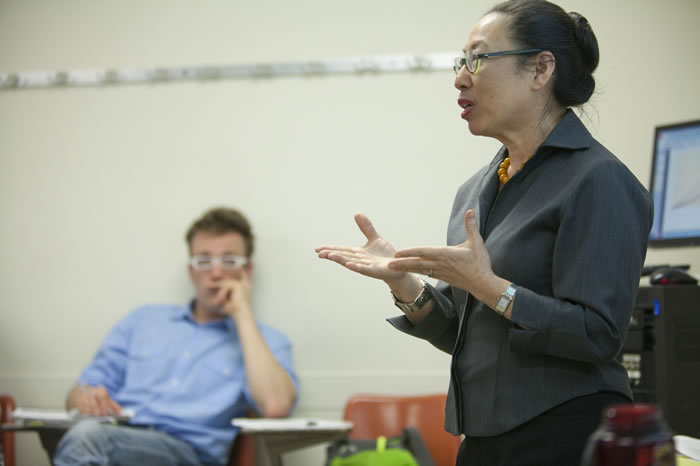Global imbalances in power between nations undermine efforts to improve health and save lives****Embargoed until 7 PM (New York Time), February 10**** |
Feruary 11, 2014 - The organisation of political power within and between nations and citizens fails to protect the public's health, according to the findings of a new Commission from The Lancet and the University of Oslo, published today . These power asymmetries, together with the piecemeal way that global decision-making has developed since World War II, are having a disastrous effect on human health, say the report's authors. The fact that people's life chances differ so sharply from one community to another is not simply a problem of poverty—it is one of socioeconomic inequality. Poor countries and populations that are already disadvantaged suffer the most. The Lancet-University of Oslo Commission included 18 leaders in research and policy-making from diverse fields, including health, finance, development, environment, human rights, and foreign policy [1]. Leading development economist and New School professor of international affairs Sakiko Fukuda-Parr served on the panel, and is available for comment. The Commission gathered evidence over two years to examine how human health is affected by the current system of global decision-making (global governance). Its findings add to the growing public discontent with an unjust global economic system that favours a very small elite with great wealth at the price of environmental and social degradation that negatively affects health equity. To reverse this trend, the Commission recommends that health equity should be an objective of all political, economic, and social sectors. Although biomedicine has delivered enormous benefits to individuals—eg, a continuous stream of effective new vaccines, medicines, and diagnostics—this technological approach alone cannot address the root causes of health inequity. A fundamentally unjust global economic system that favours a very small elite with great wealth requires those responsible for the public's health to adopt a much broader agenda for change. The Commission identifies seven areas where political and economic injustices especially affect population health—the global financial crisis and resultant policies of austerity; knowledge and intellectual property; investment treaties; food security; transnational corporations; migration; and armed violence. For example, global food production is enough to cover 120% of global dietary needs—there is more than enough food to meet global demand. However, the availability of food is not spread evenly. Food security, the Commission concludes, is a political choice, and political corporate interests are preventing the equitable distribution of food sources worldwide by prioritising wealth over health. This inequity not only affects the millions who experience undernutrition and food scarcity, but also the ever-increasing numbers of people in countries of all incomes who experience ill-health and premature death from overnutrition and obesity. According to the Commission, five key dysfunctions in global governance, are severely impeding improvements in health outcomes. These dysfunctions include democratic deficits (the exclusion of civil society and marginalised populations from national and global decision making); weak accountability (inadequate means to constrain power); institutional "stickiness" (decision-making processes that fail to adapt to the changing needs of people); inadequate policy space for health (health concerns are too often subordinated to other objectives, such as economic growth and national security); and the absence of international institutions (eg, treaties and courts) to protect and promote health [2]. The Commission concludes that existing mechanisms of global governance are unfit for purpose—they are too fragmented and ineffective to deliver better health for the majority of people in the world. As the international community negotiates a post-2015 global development agenda, the Commission argues that the current system of global governance for health should be reformed. The Commission makes four specific recommendations: first, the creation of a Multi-stakeholder Platform on Governance for Health (a place for deliberation and debate to strengthen accountability for health); second, the formation of an Independent Scientific Monitoring Panel to measure and track progress in overcoming the political, economic, and social determinants of adverse health outcomes; third, health equity impact assessments of all policies and practices; and finally, strengthening existing mechanisms (eg, human rights instruments and mechanisms for sanctions) to protect health and build commitment to global solidarity and shared responsibility [3]. “The reason why so many of us have stunted health and lives is because of the failures of our institutions to manage the health consequences of economic activities,” said Fukuda-Parr. “Our economic governance institutions have not kept up with the global integration of the market. The challenge for world leaders in addressing health challenges of the twenty-first century is international cooperation, to create institutions - norms, organizations, informal and formal rules - to reduce global health inequities.” According to the Commission’s chair, Professor Ole Petter Ottersen (University of Oslo, Norway), much greater political will is needed for substantial reform: “Health inequities are morally unacceptable and are exacerbated by the current system of global governance that places wealth creation over human health. Health equity is a precondition, outcome and indicator of a sustainable society and should be adopted as a universal value of a nation’s success alongside economic growth. This should be a shared social and political objective for all.”* “There have been tremendous advances in the screening for diseases and treating ill heath within the health care setting over the last two decades. But only a very small proportion of the world’s population has benefited. These unacceptable health inequities within and between countries cannot be addressed within the health sector by technical measures, or at the national level alone. We urgently need all policies tested for their potential impact on human health. And that requires global agreement that economic growth is celebrated in partnership with health equity. “Economic growth alone will not deliver good health to the most vulnerable sectors of society without addressing the intertwined global factors that challenge or destroy healthy lives,” says Richard Horton, Editor-in Chief of The Lancet. “These challenges can be addressed only by reaching beyond the health sector. Solutions will require...a more critical understanding than has hitherto been displayed by policy makers of the determinants of human survival and wellbeing. Success will demand courage and flexibility to challenge the consensus that so inhibits the changes needed to bring about greater equity. This Commission can, we hope, be a contribution to this need for greater critical understanding and challenge.” To interview Professor Sakiko Fukuda-Parr, email [email protected] or phone 646-732-7840. Professor Fukuda-Parr is available for interview in English, French, and Japanese. For all other media requests, please contact Daisy Barton, The Lancet journals, London, UK. T) +44 (0) 207 424 4949 [office] / +44 (0) 7920 592 635 [mobile] E) [email protected] For more information about the Commission and further quotes from Commissioners, see: http://press.thelancet.com/governancebackground.pdf For background factsheet, see: http://press.thelancet.com/governancefactsheet.pdf NOTE: THE ABOVE LINK IS FOR JOURNALISTS ONLY – IF YOU WISH TO PROVIDE A LINK TO THIS PAPER FOR YOUR READERS, PLEASE USE THE FOLLOWING, WHICH WILL GO LIVE WHEN THE EMBARGO LIFTS: http://www.thelancet.com/journals/lancet/article/PIIS0140-6736(13)62407-1/abstract NOTES TO EDITORS: The report will be launched at a conference in Oslo, Tuesday 11 February 2014 http://www.med.uio.no/helsam/english/research/global-governance-health/events/launch.html [3] The full recommendations are: |
| Founded in 1919, The New School was born out of principles of academic freedom, tolerance, and experimentation. Committed to social engagement, The New School today remains in the vanguard of innovation in higher education, with more than 10,000 undergraduate and graduate students challenging the status quo in design and the social sciences, liberal arts, management, the arts, and media. The New School welcomes thousands of adult learners annually for continuing education courses and calendar of lectures, screenings, readings, and concerts. Through its online learning portals, research institutes, and international partnerships, The New School maintains a global presence. Learn more at www.newschool.edu. |
 |
COMMUNICATIONS AND EXTERNAL AFFAIRS |
| 79 Fifth Avenue New York, NY 10003 www.newschool.edu |
PRESS RELEASE |
Media Contacts: Sakiko Fukuda-Parr Sam Biederman, Daisy Barton, The Lancet |
|
|
